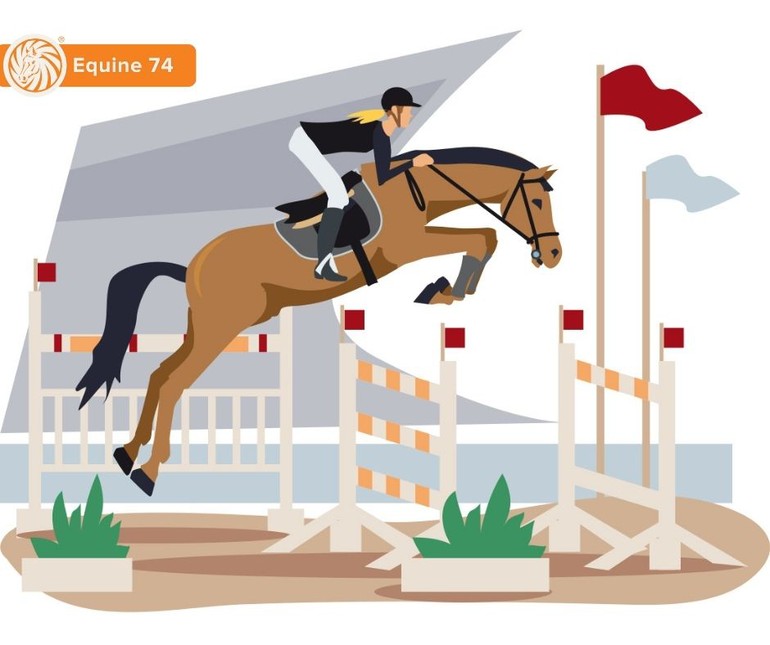At 27, Laura Klaphake has achieved great success: awarded the Golden Rider Badge at the age of 18, 2017 German show jumping champion, team bronze at the 2018 World Championships. She has been using Equine 74 Gastric for two years and tells us of her experiences with it.
The psyche has a tremendous influence on a horse’s well-being
- Laura Klaphake -
Equine 74: It’s well-known that with humans, not only is the stomach a factor in a person’s well-being, but also in their success. Do you see the same with your horses, who are all top athletes, after all?
“The disadvantage with horses, naturally, is that they can’t speak. When we humans have stomach pains, we say ‘I don’t feel well’ or ‘I’m feeling anxious or under stress’, and then we look for a way to get rid of our stomach problems. With horses, you can sometimes see that they are stressed or have lost their appetite, but they can’t say ‘My stomach hurts’. This makes recognising stomach problems quite difficult.”
“It’s hard to recognise the symptoms, especially in new horses that I’m still getting to know. The horse is exhibiting noticeably unusual behaviour, but you can’t say for sure where it’s coming from. That’s why it’s great when the horses are with me for some time, and I can really get to know them. I learn what makes them tick and how they behave at home and at shows.”
Equine 74 Gastric counteracts the effects of constant stress-related acid problems with high mineral acid buffering.
Learn More
“At important events, I get nervous myself and won’t have much of an appetite. It’s probably the same for horses. Fortunately, I’ve not yet had a horse that’s been diagnosed with stomach ulcers. We had our suspicions with one horse, and since then I’ve taken preventive measures for the gastric health of all my horses. When you reach the point where a stomach ulcer is diagnosed, it is already pretty far advanced.”
Equine 74: Horse owners often speak of equine stress. What do you do to reduce stress in your horses?
“We try to bring variety to their daily routines and training, and we turn them out daily. It does them immense good to see new things. It’s the same for us humans, doing the same thing every day would bore us too.”
“As far as feeding goes, my mum taught me, ‘You can eat anything, just in moderation”, and that applies to horses too. I know that horses should eat only moderate amounts of sugar, nevertheless I like to reward the horse with a sugar cube after a good training session, it’s like a piece of chocolate for me. It does the soul good. I believe that when the soul is satisfied, then the body will be too, and that applies to both humans and horses.”
"At major tours like the Sunshine Tour (Vejer de la Frontera), there are sometimes paddocks and pastures offered for rent; we use them to give our horses some balance during stressful show schedules. Most show facilities won’t have that. We’ll lead them or let them graze, and that’s also good for the stomach. I just want the horses to be happy.”
Equine 74 Gastric Make your horse feel happy inside!
Natural Acidbuffer, optimized pH-level in horses stomach and gut that helps for better performance and satisfaction without compromise. Because good for your horse should also mean good for you!
Order A Free Feed Sample
Equine 74: How do you adjust your horses’ feed to training, preparing for shows or, say, during breaks from training?
“Horses are similar to people in this regard: when we are less active, we need less food accordingly, and when we do more, we need to eat more. We feed them lots of hay independent of training condition, and concentrates are always measured according to individual requirements.When we travel to shows, we give them more to eat to counteract any stress.”
Equine 74: Your contact with Equine 74 happened through your trainer Franke Sloothaak and your father Joseph, who have known Christian Dietz for many years and used the supplements. What motivated you specifically?
“My dad told me about Equine 74 Gastric and said that it was great for preventing gastric problems. Franke also had very good experiences with Equine 74 Gastric and recommended it highly. In my opinion, experience is the best teacher. Recommendations from friends carry much more weight than any product description; ultimately it has to work, and it does work. I’ve been feeding my horses Equine 74 Gastric for about two years.”
Equine 74: Did you notice changes afterwards?
“I had a new horse that was very stressed, and I suspected that he had stomach problems. I gave him Equine 74 Gastric and he began to do better. It’s surely a combination of stabling, feeding, and Equine 74 Gastric that keeps the horses balanced. Our horses are now absolutely content and well balanced.”
Equine 74: Gastric problems are often dismissed as a modern equine disease. Is the subject of gastric problems increasingly discussed in rider circles?
“I don’t believe that fewer horses had gastric ulcers in the past; I think that the focus has changed and that riders have become more aware of the problem. Often, it is found that, in horses with lameness or back pain, the causes are gastrointestinal. Rider awareness has changed in this respect. Before now, humans apparently did not suffer from burnout – surely they did, there just wasn’t a name for it yet.”
Equine 74 Gastric counteracts the effects of constant stress-related acid problems with high mineral acid buffering.
Learn More
Equine 74: What would you recommend riders do to prevent their horses from suffering from stomach pains, gastric mucosa irritations, or even gastric ulcers?
“I believe that the key to health is in the soul. Allow your horse to have a rich life. I find feeding an extremely important aspect of preventive health care. It certainly can’t hurt. Don’t wait until it’s too late and gastric ulcers develop. I would tell riders to listen to their horses. You will start to know your horse and recognise changes that occur to their eating or riding behaviour. Don’t ignore these feelings, as they can be indications of a gastric ailment. Horses want to do what’s asked of them, but when they have gastric issues that’s simply not possible. I recommend that you put yourself in your horse’s shoes – what could you do well now? After all, the goal is building a team with your horse and supporting him wherever possible.”










